#and how it contributes to the the overall themes of the film?
Text
What most people don’t know about the scene where Goncharov tells Andrey about his childhood home in the mountains is that it was completely unscripted!
The scene was supposed to end after Goncharov threw his arm around Andrey’s shoulders but Scorsese never called cut, and the speech that followed (and is widely regarded as one of the most beautiful monologues ever filmed) about how home is a time you can never return to WAS TOTALLY AD LIBBED!
#goncharov#unreality#andry#martin scorsese#goncharov (1973)#iconic acting tbh#that's called knowing your character#and how it contributes to the the overall themes of the film?#i am deceased
9 notes
·
View notes
Text
Note: I am finally posting this (something that has been in my drafts for actual months) because @pinkeoni hurt my feelings talking about Will and Alan Turing). So...you can inavertently thank Robin for this LMAO
I don’t delve much into Stranger Things analysis anymore, but having just watched The Imitation Game, the biopic they made about Alan Turning in 2014—I’m thinking that maybe Will doing his presentation on the man might have an delightful (secondary) parallel to this film’s exploration of him, given Will’s burgeoning queerness + ongoing relationship with normalcy.
Throughout the film, the ongoing theme of "differences bringing about greatness/change" permeates every character, but Turing especially—something that the conversation he has with a character named Joan near the end of the film showcases well:
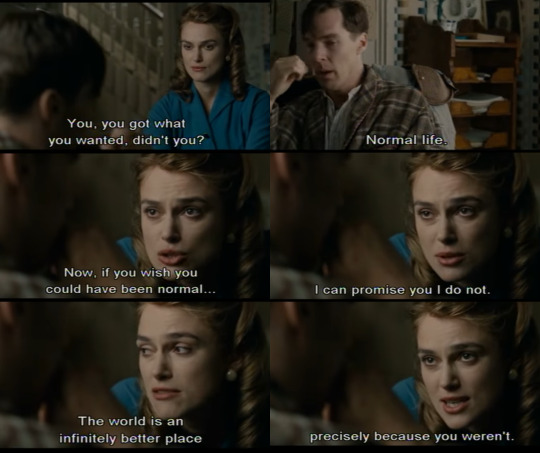
In this conversation, Joan is trying to encourage Turing to come out of depression and rely on her, given he is struggling immensely with physical effects of chemical castration—which he obviously resents, but feels is better than giving up the life he has and being “entirely alone” because of his sexuality / desires (sound familiar)?
This ongoing exploration of queerness as tied to greatness and/or otherness is something that is very often explored in Stranger Things as well, primarily with Will—to the point where Will has nearly the exact conversation Alan has with Joan with Jonathan in S2:
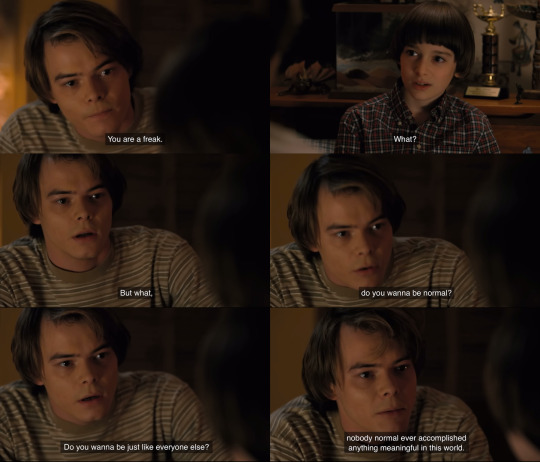
—in addition to us exploring the relationship between a lack of normalcy, queerness and even nerdiness through/by other characters like Robin, Mike & Lucas.


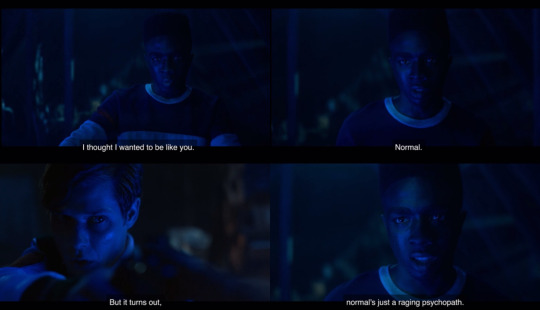
Now (as we all know), Will’s homosexuality has been forever and inherently linked to his otherness/lack of normalcy—whether with how he was bullied in S1-S2, his struggle to be open with his feelings for Mike in S4, or the million literal / metaphorical things in between, Will has always been encouraged not to conform, but still struggles to self-actualize enough to embrace himself fully…which most of us expect for him come S5.
Basically: the underlying theme of this film for Turning (much like the underlying themes at the heart of ST) revolves around how most people strive for normalcy, despite normalcy being undesirable if you expect to do anything great/interesting. While Turing was a homosexual man, he was also one who struggled greatly with fitting in overall—much like Will, which I think perfectly reflects how the Duffers have set up their S5 resolution + solving Will’s ongoing internal struggle with his romantic feelings for Mike + ongoing dissonance with normalcy.
(sidebar: there are articles exploring the idea of "embracing difference" in this movie that parallel Will's "Being Different." See: Embracing Difference - The Imitation Game)
Both TIG!Turing and Will exist in on the fringes on their respective worlds due to their differences and homosexuality—just as both of them are both most inspired by their (romantic) love for their male best friends....to the point that those relationships define their contributions to the story: Turing with the machine that helped the Allied powers break the Nazi Enigma code, and Will in ways I'm sure we'll be talking about in 2025.

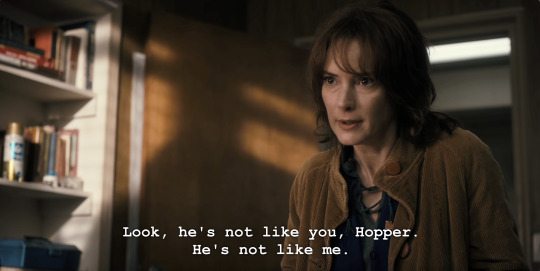
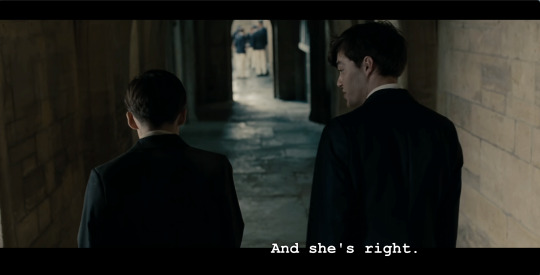


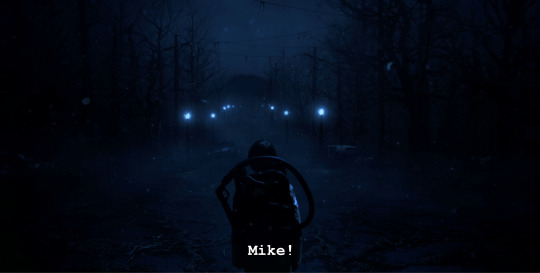
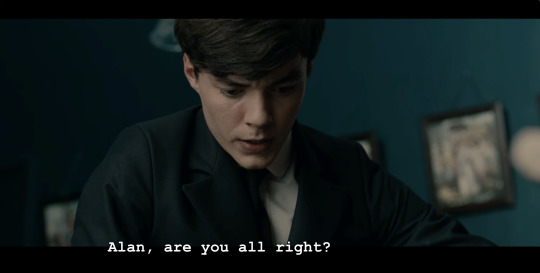
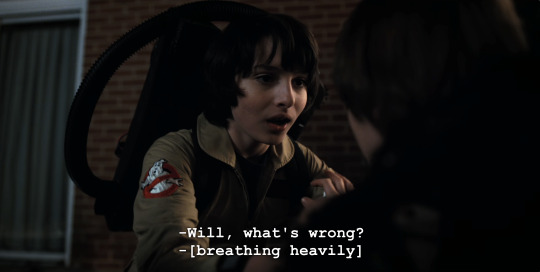
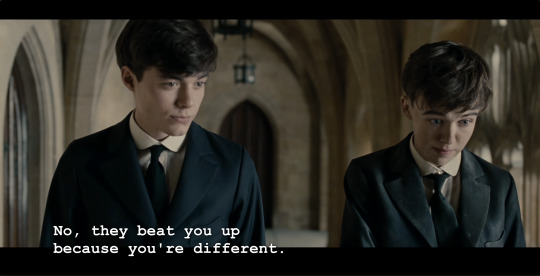

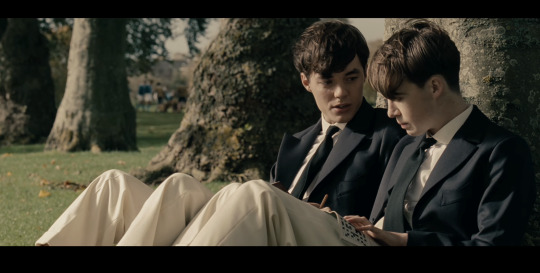
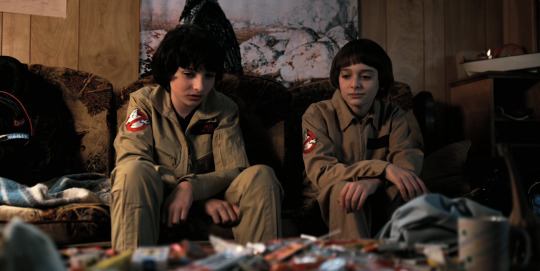
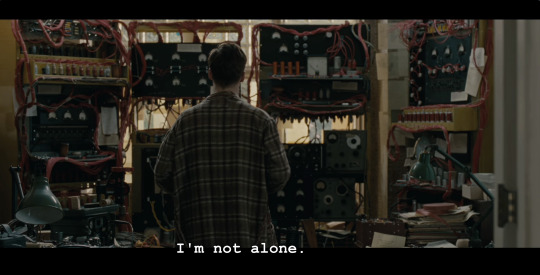
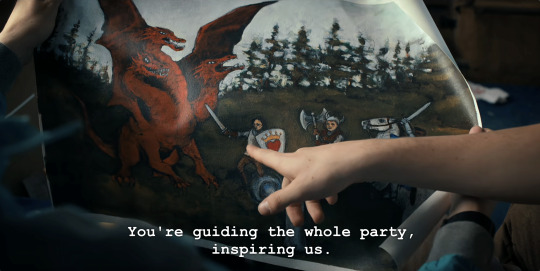

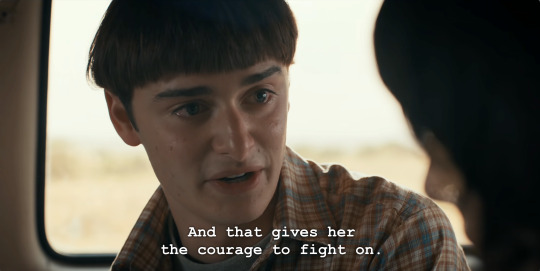
TL;DR: While Will still has another season to sort through what his love for his best friend means for both his rejection of normalcy and his greatness, it's fairly apparent that (much like Turing) it is the embracing of both difference and homosexuality that leads to greatness—no matter how the world feels about that overall.
(We love it when the gays learn life lessons (and when they win)).
#byler#will byers#will byers core#alan turing#st analysis#my st commentary#st commentary#st parallels#stranger things#suprise byler commentary from Marie for Christmas? more likely than u think#this has literally been in my drafts since...at least four months lol. I pulled a bunch to finish it and I'm glad I did lowkey.#Its not stuff I talk about much anymore but. you will never not see me showing the masses how ST storytelling is reflected a MILLION places#ANYWAY#the me tag#gay mike wheeler#only kinda but. yes lol
105 notes
·
View notes
Text
🧛🏽♀️🧟♀️👹Horror Movies for Beginners🦇💀👻
Disclaimer: This is something I'm doing for fun and because I've had people in the past ask me for suggestions for people who are interested in horror but are too scared to get into it. I'll be adding more to this list as I think of more.
Tips: For one thing, I would suggest checking doesthedogdie.com before watching any horror movie. It's a great source for triggers ahead of time. The people who contribute to it can be very helpful too, as they sometimes provide timestamps as to where in the movie the triggers take place so you can skip over them.
I would also suggest horror comedies, as they provide humor to lessen the blow of the scary stuff.
Spooky Movies for Beginners
Ghostbusters, Ghostbusters II, Ghostbusters (2016)

Yes, I am including 2016. No, I am not ashamed to like that version. No, I will not be taking criticism. I did not include Afterlife because I have not seen it yet. That aside, I do recommend the Ghostbusters movies listed. The movies contain a balance of horror and comedy and cool science-fiction tech. They're fun, but not too scary for beginners.
Haunted Mansion (2003)
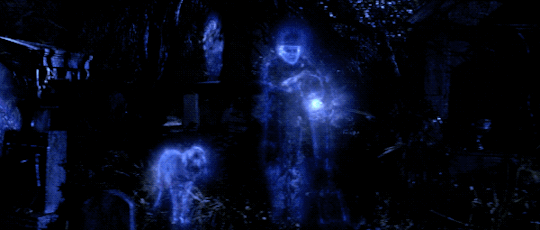
Most of the "scares" in this movie aren't really scary. If you've been to Disneyland and can ride through the attraction with no problems, you can probably get through this movie. It's geared more towards families, so if you have kids, they'll probably enjoy watching it with you. However, there is an anti-Romani slur used repeatedly throughout the movie. Also, proceed with caution if you have a fear of spiders.
Coraline (2009)

This movie is animated but contains a lot of creepy imagery. Some kids might get creeped out by it. If you like "rabbit hole" type movies that involve stumbling upon hidden and treacherous worlds, you'll probably like it. Henry Selick, the dude who made Nightmare Before Christmas, is responsible for this film adaptation.
Wendell and Wild (2022)
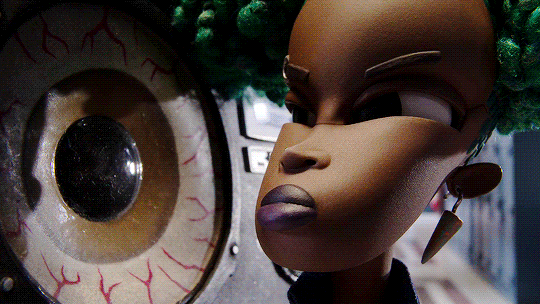
Another animated movie from Henry Selick with Jordan Peele. Two mischievous demons cause havoc. Peele and Kegan-Michael Key play the demons. Oh, and it's a middle finger to private prisons and the school-to-prison pipeline, so there's that. If you're too afraid to watch Get Out, Us, or Nope, but want to experience the horror magic Peele, you will probably enjoy this one.
The Sixth Sense (1999)
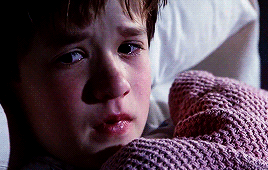
I'm hesitant to put this one on the list because this one does contain disturbing imagery that can be too much for a beginner. But this is a really solid movie even if the ending has already been spoiled for you. How scary the ghosts are really isn't what this movie is all about--the themes of grief and healing are really what it's about.
Gremlins (1984) and Gremlins II: A New Batch (1990)
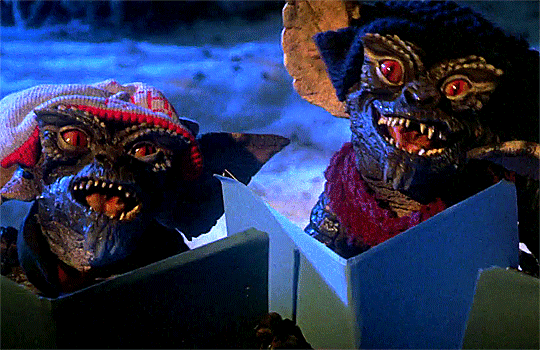
When I was a kid, my parents thought they could scare me into behaving by saying the gremlins from these movies were going to get me. But I loved the gremlins because they were fun and I wanted to be their friends lol. If you like practical effects, you'll probably like this movie. I don't think these movies would be scary for most adults, but kids might be a little iffy with the gremlins--but Gizmo is adorable and might be able to balance out the scariness. However, there is some...questionable Asian representation typical of 80's movies. Proceed with caution.
Warm Bodies (2013)

This movie was released when the Twilight craze was at its height and I remember being shit-talk about that, but this movie is worth watching. Yes, it is about a zombie falling in love with a living human, but it really is adorable (in my opinion) and the movie is overall clever and fun. I will say that there are some parts that might be a little too much for beginners. The "bonies" might be a little too scary. However, the "scary" parts are very brief and they are not the center of the story.
To be continued...
#horror recs#horror recommendations#horror for beginners#warm bodies#germlins#gremlins ii: an new batch#wendell and wild#jordan peele#henry selick#coraline#the haunted mansion (2003)#ghostbusters
37 notes
·
View notes
Note
I loved reading some of your theories, they're enlightening. If I may ask, how many times do you reread a manga or a scene in order to catch up these details and connections between seemingly unrelated events? That kind of global vision must require multiple readings. Do you also follow some kind of process or have you interpreted media for a long time?
HEYYY!! Thank you very much, it makes me happy to see that people like my theories!
I couldn't tell you exactly how many times I read a work before analysing it. If we take Chainsaw Man, by dint of analysing it almost every week I'm beginning to know the forty or so chapters of Part 2 by heart.
If I can give you a few pointers on my method...
First of all, I'd say that the more media you consume, in any medium (manga, books, films, series, even music!), the more you train your brain to interpret.
Because knowing how to interpret is correlated to your reading experience. It familiarises you with narrative biases, script construction, different ways of presenting the same theme, but also different authorial habits.
Fujimoto follows the rule of saying as little as possible, while other authors make extensive use of the narrator, such as Jun Mochizuki, who likes to place the story through the prism of his main character (Oz / Noé).
The more you like an author, the more familiar you become with their writing style. Which makes you more responsive.
As for my personal experience, I use a lot of different media. For example, I love classics, which are books that are complicated and not always very explicit. Especially when the authors take an outsider's point of view and play with chronologies, or even use a very wide range of characters.
But if you're waiting for a precise method, it must be your own. Once again, interpretation is personal. Nobody reads the same way.
When a chapter of CSM comes out, for example, I read it first... to find out. Generally I shout, I cry, I don't understand anything, but I let it settle. The first reading is essential because it's the only reading you won't intellectualise. It's an accumulation of pure emotions and it's the rudder that helps you understand what an author wants to provoke in you.
Then I reread the chapter, several times, until I see other things, the narrative construction, lines that tickle me, the breakdown. I also always look at the chapter title!
I write down my ideas in an unconstructed way and then compare them with the overall work (part 2 for CSM). Because mangaka write from this point of view, a chapter is just one piece of the jigsaw, so it's essential to stand back and understand its contribution to the rest.
Here's hoping my vague advice helps a little <33
#ask#jun mochizuki#fujimoto tatsuki#chainsaw man#csm part 2#csm#get obsessed with a work and you'll see everything will come naturally#it takes me about 2 hours / CSM chapter to come up with my ideas and about 1 hour to write them which is quite fast ??
34 notes
·
View notes
Text



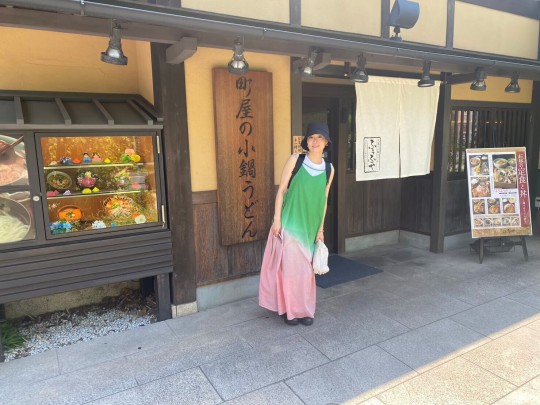
2023/09/03 Blog post by Wakana 会報とジブリとおNewなコンテンツ〜9月10日スタートです〜
❗This is Fan Club EXCLUSIVE content❗
❗PERSONAL USE ONLY❗
Do ❗NOT SHARE❗ on other sites
❗Join her FAN CLUB! Check out my detailed TUTORIAL ❗
Latest FC Issue, Ghibli and Brand New Content ~Starting September 10~
I think most of you should have received the latest issue of the Fan Club magazine by now\\\\٩( 'ω' )و //// This time there's a lot of stuff about my 3rd album "Sono Saki e", the release events, and my Billboard Lives. As always, there are many photos and a long interview, so please enjoy it and take your time going through it~♪
Hello, this is Wakana (0 ̄▽ ̄0)/
For my "Journey to Catch Sharks"-series I visited the infamous Osaka Kaiyukan!! It is already the second appearance of this aquarium in my magazine😍And in the Member Contribution Corner I am introducing all the recommended foods you sent me which are effective against summer fatigue 😋♡ You submitted a lot of pictures of different meals, everything looked delicious! Thank you for your submissions!
By the way, the other day we made a quiet announcement on the FC site, we will introduce new special content for Botanical Land members!! It's called "Wakana's Talk Garden"! ! ! ! ! ・:*+.\(( °ω° ))/.:+That's right, I'm starting a podcast! 😄A new podcast will be posted once a month, the first episode is scheduled for September 10th. For future episodes I will let Botanical Land members decide on an overall theme and everyone can send in e-mails (I'm also thinking about small presents to those whose e-mails get picked up to be read during an episode). Be sure to join me 🤗And please look forward to the first broadcast! \(^o^)/
Also, as announced a few days ago, I will be participating in the Studio Ghibli tribute album "Singing Ghibli"! I can't tell you how happy I am…😭😭😭😭✨✨Produced by Satoshi Takebe, this album is set to be a grand spectacle in which many artists express "Ghibli" in their own unique way. I personally love Ghibli from the bottom of my heart for introducing me to so many fantastical world, from the very first film "Nausicaä of the Valley of the Wind" up until the most recent release, The Boy and the Heron", these works have had a huge impact on my life so I am truly grateful to be involved in this particular music project. I can't wait for all of you to receive the finished product! ! (((o(*゚▽゚*)o))) Click here for the special site ♪ → https://ghibliwoutau.com
Lastly, before visiting "Sakuya Konohana Kan" and "Kaiyukan" the day after my Billboard Live in Osaka, I actually went to a restaurant, so here are some pictures of that♡ It was an udon restaurant called "Fuufuya"! Since it was a very hot day, I had cold udon with grated yam and mushrooms😍 It was delicious♪
Until next time☆( *'▽'*)/
***Wakana***
#kalafina#wakana#wakana blog#botanical land#fan club exclusive content#Wakana's Talk Garden#oooohhh#looking forward to the podcast
27 notes
·
View notes
Text
The Princess and the Frog
youtube
In what ways does the film’s score situate the story with its narrative context?
"The Princess and the Frog" employs its score to situate the story within its narrative context by drawing on a diverse range of musical genres, including jazz, blues, gospel, and traditional New Orleans music. The score dynamically responds to the emotional arcs of the characters and the progression of the plot, enhancing the audience's engagement with the narrative. Additionally, recurring musical motifs reinforce thematic elements and character development, providing a cohesive and immersive experience that enriches the overall viewing experience. However, the film did face criticism for its portrayal of Louisiana Voodoo and accusations of historical negationism regarding its depiction of the Southern United States during the Jim Crow era. Overall, the score plays a vital role in shaping the audience's understanding of the story, conveying the cultural richness of New Orleans, and deepening their connection to the characters and themes of the film.
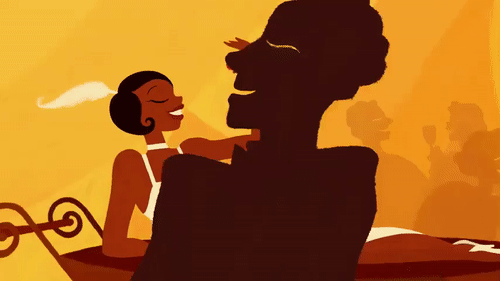
How do songs use character performance to push cultural authenticity in the film’s diegesis?
Unlike in Moana, The Princess and the Frog's score has received praise for the character performances within the songs and how they enhance cultural authenticity by incorporating diverse accents and vocal styles that resonate with the film's setting. For instance, Princess Tiana's Southern drawl, Louis's bayou accent, Dr. Facilier's Creole intonations, and Ray's Cajun inflections authentically represent the characters' backgrounds. These accents, combined with genuine vocal deliveries, root the characters firmly within their cultural milieu, adding depth and realism to their portrayals.

In what ways does the film use musical “framing” to structure the score within familiarized styles?
As Armstrong states, "Musical “framing” is a structure in which a familiar set of ‘normal’ musical sounds precede, follows, and accompanies a different set of unfamiliar or ’other’ sounds". (1) In this case, this film employs musical "framing" to structure the score within familiarized styles, blending elements of traditional or "normal" Disney music with the distinct or "other" sounds of New Orleans jazz and blues. For instance, the opening number "Down in New Orleans" acquaints audiences with the film's setting and characters through a lively jazz ensemble, establishing the tone for the rest of the film. As the story progresses, the score seamlessly transitions between different musical styles, such as the gospel-inspired "Dig a Little Deeper". Nevertheless, throughout the movie, one can consistently discern a Disney element, as exemplified prominently in the ballad "Ma Belle Evangeline".
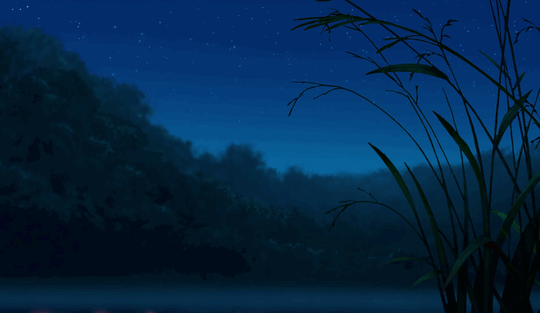
How does the diverse range of musical genres used in "The Princess and the Frog" contribute to the film's portrayal of its setting and era, particularly in capturing the essence of 1920s New Orleans?
How does Disney navigate the fine line between celebrating cultural diversity and potentially appropriating cultural elements in the musical score of "The Princess and the Frog"?
(1) Armstrong, Time to Face the Music: Musical Colonization and
Appropriation in Disney’s Moana, 3.
15 notes
·
View notes
Text
Music Video Analysis
Part 1: "thank u, next"
youtube
Ariana Grande's "thank u, next" music video is a vibrant homage to iconic romantic comedy movies, including "Mean Girls," "Legally Blonde," "13 Going on 30," and "Bring It On." In the video, Grande recreates memorable scenes from these films while infusing them with her own unique style and narrative, inviting famous friends and other celebrities that have been connected to her to reference her life within these recreations. Throughout the video, Grande reflects on themes of personal growth, self-love, and empowerment, and cleverly addresses her own love life and the public's fascination with it. Having publicly addressed her love for old rom-coms, she also celebrates the strength and resilience of female protagonists from the rom-coms she references. The video showcases Grande's creativity and artistic vision, as she embraces her independence and confidently moves forward after experiencing heartbreak. Overall, "thank u, next" is a visually captivating and empowering tribute to both iconic movies and Grande's own journey of self-discovery.
Deleuze explores the complex interplay between repetition, generality, and law, challenging traditional philosophical notions. Deleuze emphasizes “repetition and generality are distinct; repetition involves non-exchangeable singularities, while generality allows for exchange or substitution of terms.”(1) For him, repetition is not about replicating identical instances but rather about the emergence of difference within a repeated pattern. He argues that genuine repetition involves the recurrence of non-identical elements or singularities, which he terms "difference in itself." This notion of difference disrupts traditional conceptions of identity and sameness, highlighting the dynamic and unpredictable nature of repetition.
Each segment of the “thank u, next” music video references iconic romantic comedy movies, and represents a repetition of familiar narratives and tropes. However, rather than simply replicating these stories, Grande infuses them with her own unique perspective and experiences. We see this from the very start, when she recreates the iconic introduction of the character Regina George from “Mean Girls” (0:00:01). While the general idea and tone of the scene remains the same, she replaces Regina with herself, and inserts many references from her own life that were considered scandalous by the media, poking fun at the public’s interest. In another shot, still as Regina, Grande is scrapbooking in the famous Burn Book from “Mean Girls” (0:00:43), but instead of writing nasty secrets like the original movie does, she pays homage to her previous relationships with nothing but love and respect, aligning with the lyrics of each ex while she flips the page from one ex to the next. These reinterpretations of familiar narratives highlight Deleuze's notion of difference within repetition. Despite drawing inspiration from existing cultural tropes, Grande introduces new elements and perspectives, allowing for the emergence of difference and novelty within the repeated patterns.
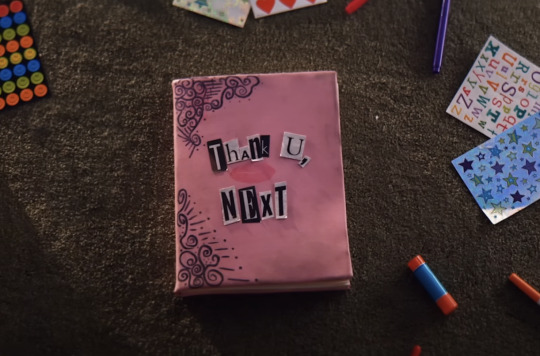
Baudrillard examines the dominance of consumption and the signifier in capitalist societies, exploring how “postmodern communication technologies, principally television, are said to flood the world with self-generating, self-mirroring images; and experience” (2). He contrasts simulation with representation, arguing that simulation has replaced representation, challenging conventional notions of reality and power dynamics. Images no longer reflect reality but create their own hyperreal realm, blurring the boundaries between real and simulated experiences. His work offers a critical perspective on the impact of hyperreality, highlighting the complexities of navigating between real and simulated realms.
In "thank u, next", Grande’s idealization of high school culture and romantic comedy (rom-com) tropes contributes to the construction of a hyperreal world, resonating with Jean Baudrillard's concept of simulation. The video references iconic high school movies like "Mean Girls" and "Bring It On," as well as rom-com classics such as "Legally Blonde" and "13 Going on 30," embodying specific tropes and narratives associated with adolescence and romantic relationships. She blurs the line of reality and simulation consistently. In one instance, Grande pays homage to the movie “Legally Blonde”, where she replaces the main character, Elle, with herself. When she talks to Jennifer Coolidge in a montage referencing the iconic hair salon, who originally plays Paulette in the film, she talks about her real life relationship as Ariana Grande, while Coolidge fully embodies her original character and responds as Paulette (0:03:20). With this exaggerated and hilarious reference to the movie, Grande’s using these classic rom-com scenes to explore her own reality ends up contributing to the construction of a hyperreal realm, where the boundaries between reality and fiction are blurred, and images and narratives take on a heightened, almost surreal quality. Baudrillard argues that in hyperreality, signs and symbols no longer represent anything real but instead simulate reality itself. Grande's idealization of high school culture and rom-com tropes in "thank u, next" contributes to the construction of a hyperreal world, where the boundaries between reality and fiction are blurred, and images and narratives take on a life of their own in the realm of popular culture.
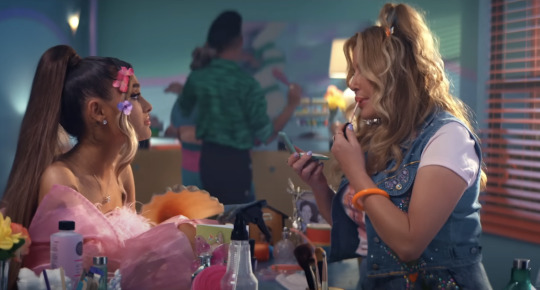
Fredric Jameson explores the impact of postmodernism on social, economic, and cultural changes, challenging the idea of a 'post-industrial' phase and highlighting capitalism's expanded hegemony. He argues that capitalism's power has intensified throughout the years, and examines how changes in capitalism's mode of production relate to new forms of cultural production, identifying postmodernism in literature, music, film, and environments as characterized by surface, pastiche, and paranoia. He discusses pastiche as a key element in postmodernism, representing a neutral mimicry without parody's satirical impulse, reflecting a shift towards stylistic diversity.
Fredric Jameson's analysis of postmodernism within the framework of consumer society underscores the dominance of capitalism in shaping cultural production and consumption. In his essay, he critiques the notion of a distinct 'post-industrial' phase, arguing instead for the expanded hegemony of capitalism. He highlights how changes in the mode of capitalist production influence cultural forms and expressions. The video itself is a product of the entertainment industry, driven by commercial interests and profit motives. It serves as a form of cultural commodity produced and consumed within a capitalist system. The references to iconic romantic comedy movies in the music video can be seen as part of a broader cultural phenomenon where nostalgia is commodified and marketed to consumers. The inclusion of many famous celebrities as the other stars in the video also highlight this obvious tactic of gaining consumer's attention. Fredric Jameson's exploration of postmodernism also offers insights into how Ariana Grande's "thank u, next" music video engages with this cultural phenomenon. Postmodernism, characterized by Jameson as a cultural shift towards surface, pastiche, and a blurring of boundaries between reality and fiction, resonates with various aspects of the music video. Grande's incorporation of references to iconic romantic comedy movies and high school culture embodies the postmodern tendency towards pastiche, where cultural elements are borrowed and recontextualized without necessarily critiquing or subverting them. While she does use them to focus on the story of her own life, the original elements of the rom-com movies aren’t particularly built on. The stylized and exaggerated portrayal of these cultural tropes reflects a focus on surface aesthetics and a blurring of the distinction between original and copied content.
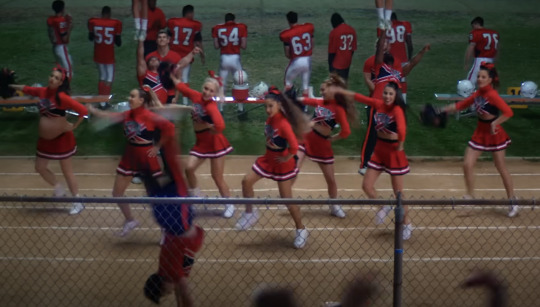
Part 2: "Freedom! '90"
youtube
"Freedom! '90" is not just a music video but a statement of artistic intent by George Michael, featuring iconic supermodels (ie. Naomi Campbell, Cindy Crawford) lip-syncing the song's lyrics without himself into the video. This decision to have the models represent him was a way to signal his desire to break free from the manufactured pop star image that had defined his earlier career. The video is visually captivating, with the models of all different looks exuding confidence and attitude as they strut and pose in an abandoned mansion. Their presence symbolizes not only glamor and beauty but also a sense of power and independence. By placing the focus on these iconic figures rather than himself, George Michael effectively distances himself from his previous image and asserts his autonomy as an artist. Thematically, the video explores concepts of liberation and authenticity. It represents a departure from the glossy, commercialized imagery typically associated with pop music videos of the time. Instead, "Freedom! '90" embraces a more raw and authentic aesthetic, reflecting Michael's personal journey towards self-discovery and creative freedom.
Through the lens of Deleuze, who emphasizes the idea that repetition involves non-exchangeable singularities and challenges established norms or structures, we can analyze Michael’s music video as a unique singularity amongst music videos themselves. In contrast to typical music videos that portray the artists in a spotlighted fashion and generally shape the narratives around the presence of the singers, “Freedom! 90” chooses to feature supermodels lip-syncing to his song. This departure from the expected repetition of the artist's presence challenges the conventional structure of music videos and disrupts the established norms of representation. Additionally, his decision to step back and allow the models to take center stage can be seen as a form of resistance against the manufactured image and commercial pressures often associated with the music industry. In this video, he intentionally distances himself from his previous image, which is symbolically conveyed through visual elements, like leaking water. Water is often associated with purification and renewal, and its presence in the video suggests a cleansing process—a metaphorical washing away of the old to make room for the new. As the water pours from various sources like the walls and the ceiling (0:03:22), it represents a release from the pressures and expectations of celebrity, allowing George Michael to distance himself from his previous image and embrace a fresh start. By breaking away from the expected repetition of celebrity presence, the video embraces a new form of repetition—one that is non-exchangeable and challenges the norms of representation and identity.
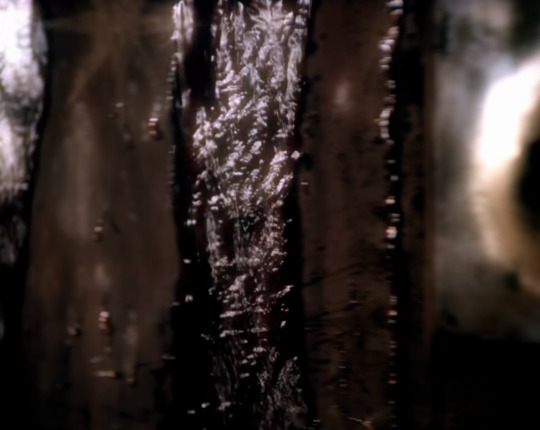
In Baudrillard's framework, Michael’s breaks free of the traditional simulation of artists we typically see from the music industry. Many artists in the music industry are carefully curated and marketed by record labels to fit specific personas or images that appeal to target demographics. These constructed identities don’t reflect the artist's true self or experiences, leading to a simulated version of their identity being presented to the public. The music industry relies heavily on media coverage and public relations strategies to shape public perception of artists and their work. In his early years as a pop star with Wham! and as a solo artist, George Michael was presented to the public as a polished, marketable figure with carefully curated image and persona. This manufactured image, while successful commercially, often overshadowed his true identity and artistic intentions. In later years, George Michael sought to break free from the constraints of his manufactured pop star image and assert his authenticity as an artist. As his lyrics illustrate the process of “breaking free” and deviating from societal expectations, he includes the iconic blazing jacket (0:2:18). The blazing jacket worn by a model in the video serves as a powerful metaphor for shedding the past and breaking free from the constraints of fame. As the jacket ignites and burns, it represents the destruction of the old persona—the glossy, manufactured pop star image that George Michael had become known for. By showcasing the jacket engulfed in flames, the video symbolizes the artist's desire to let go of his past identity and emerge anew.
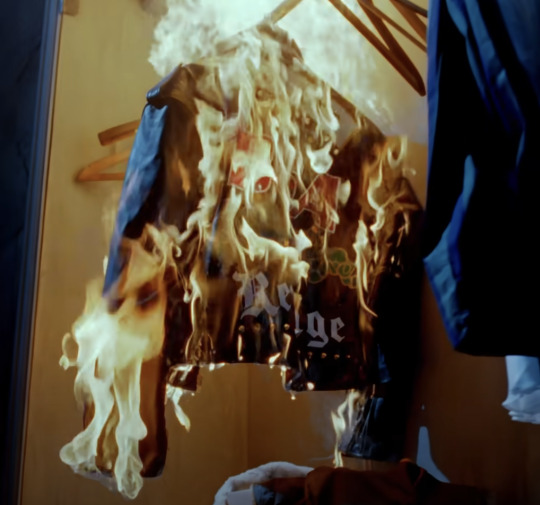
Jameson warns readers about the “death of the subject”(3), refers to a shift in postmodern culture where traditional notions of individuality and personal identity are destabilized or decentered. This concept suggests that in contemporary society, the individual subject becomes increasingly fragmented and deconstructed, unable to maintain a coherent sense of self amidst the complexities of postmodern life. He argues that various cultural and technological developments, such as the rise of mass media, globalization, and digital communication, contribute to the dissolution of the subject. These forces work to erode the boundaries between individual and collective identity, as well as between public and private spheres. As a result, the subject is no longer able to maintain a stable and unified identity but instead becomes fragmented and dispersed across multiple discourses and social contexts. In George Michael's "Freedom! '90" music video, he subverts the notion of the "death of the subject" by reclaiming agency and autonomy over his own identity and artistic expression. Towards the end of the video, the jukebox and guitar previously featured are blown up. These actions can symbolize a radical departure from the artist's past image and musical style. These acts can be seen as symbolic gestures of rebellion against the commodification of music and the constraints of traditional celebrity culture. The jukebox and guitar represent established symbols of music consumption and rock star imagery. By blowing them up, the video rejects the superficiality and commercialism associated with these symbols, challenging the idea that music and art can be reduced to mere commodities for consumption. Instead, it asserts the importance of authenticity and creative freedom in the face of commercial pressures. It can also signify a declaration of independence and a refusal to conform to expectations imposed by others. Additionally, the destruction of these symbols may represent a desire to start anew and redefine oneself creatively. Blowing up the jukebox and guitar in the music video can be interpreted as a symbolic act of liberation and a statement of artistic autonomy, subverting Jameson’s idea of “death of the subject” and challenging established norms and cultural expectations.
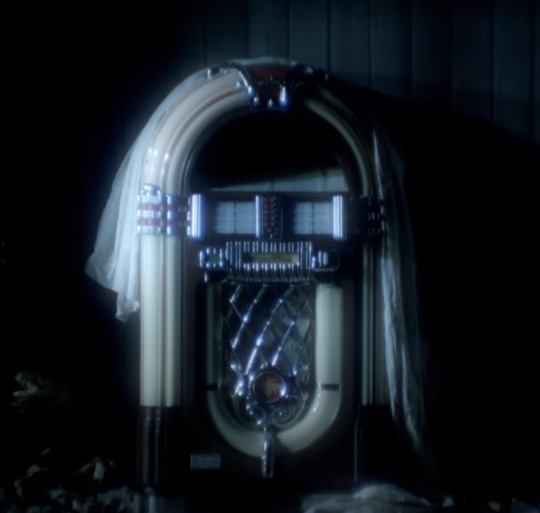
Questions:
- How does Grande's use of references to iconic movies contribute to the construction of a hyperreal realm, as discussed by Baudrillard? What insights does this offer into the dynamics of cultural consumption, representation, and the construction of reality in the digital age?
- How does Ariana Grande's "thank u, next" music video embody Jameson’s idea of postmodern tendencies, particularly in the video’s engagement with commercialized nostalgia and use of fame?
- How does Deleuze's notion of repetition involving non-exchangeable singularities help us understand the significance of this departure from the expected repetition of celebrity presence? How does it contribute to the exploration of authenticity and artistic autonomy in the video?
Works Cited
Deleuze, Giles, "Introduction: Repetition and Difference" (New York, NY, Columbia University Press: 1994).
Baudrillard, Jean, “Simulacra and Simulations” (New York, NY, Pearson Education Limited: 1992).
Jameson, Fredric, ““Postmodernism and Consumer Society”(New York, NY, Pearson Education Limited: 1992).
7 notes
·
View notes
Note
[14th May, 2023.]
Hi!
Not sure how many BL fans takes BL Awards seriously,...but I certainly do, that's why this curiosity. And often times I'm left confused with not just the nomination, but the winners and the sponsors as well. It seems like only commercially successful BL, or actors with a huge fan-following tend to have a greater chance of bagging maximum awards. Whereas, BL series with terrific storyline and acting, often is overlooked, if it's either not talked about among the audience, or if the lead couple isn't that well-known or well liked.
That's why,...I'm intrigued about the fairness and inclusivity of the awards. Like for example, despite a certain BL gaining a massive popularity among the audience, neither the lead couple, nor the director or the author bags any award. Case in point: "Triage" (2022). While some random awards is being given to Bible & Build for "KinnPorsche (2022)", especially the announcement coming at the time when Build and Poi has apparently had a legal settlement.
I don't mean to discredit any BL actor,...BUT,...I'd like to know,...what is the criteria used for selecting the winners, the diversity and representation of nominees and winners, and the potential impact of these awards on the popularity and success of a series or actor.
Because,...it is important to examine the processes and criteria involved in selecting winners, and whether they are transparent and free from biases. Additionally, considering the representation of diverse themes, characters, and creators in the nominations,...selecting the right winner is crucial to reflect the broad range of talent within the BL genre.
So,...my question to you are as follows:
What criteria should be used to judge the quality of BL series in award functions? Should it be based on the acting, storytelling, production values, or other factors?
How do you think the recognition and celebration of BL series through award functions contribute to the overall acceptance and visibility of LGBTQ+ representation in media?
Are there any notable trends or patterns in the winners and nominees of BL award functions? Do certain actors, series, or production companies tend to dominate the awards, and what factors do you think contribute to that?
In your opinion, are there any deserving BL series or actors that have been overlooked or underrepresented in past award functions? Who would you like to see recognized in future ceremonies?
How influential are BL award functions in shaping the industry and driving the production of new BL series? Do you think they have an impact on the types of stories and characters being portrayed in the genre?
Should there be separate award categories for different aspects of BL series, such as acting, writing, directing, or should the awards be more general to encompass the overall quality of the series as a whole?
How have BL award functions changed over time in terms of categories, nominees, and winners, and what do these changes reflect about the genre's growth and evolution?
xoxo
Arjuna

I honestly couldn't give a rats arse about awards. They are, generally speaking popularity contests of some kind or another (whether that is the popularity within industry, or popularity with fans). Occasionally, I'll report on them if I feel like BL broke ground with that particular win.
There is one component I do consider, especially with something like Asian art awards, which is countries like Thailand (in the weaker positional politically and film quality wise) will push for categories it can win (best kiss for example), because they can win it with their catalogue. Using the show that got the biggest reach in the zeitgeist (for a style Thailand is already known to dominate, BL) is an intentional choice and has nothing to do with how anyone feels about the quality of said show or it's representation, just its reputation.
Anygay... It's a bit like the Eurovision song contents. Taste and ability, production values and so forth, has very little to do with actual results.
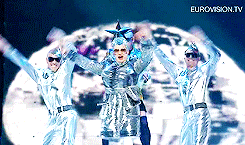
(1) What criteria should be used to judge the quality of BL series in award functions? Should it be based on the acting, storytelling, production values, or other factors?
I wouldn't. Whether there are criteria in place or not, pop culture is by its nature subjective. It depends on what your goal is from that media. What do you WANT your entertainment to do to you?
Should it tell an engaging story and exemplify fictional narration? (in which case basically all BL is out, sorry)
Should it be quality of filming and production? (in which case Japan and Korea will almost always win)
The skill of the actors? (hi Taiwan, but ALSO I would put much greater weight on comedy which is a lot harder to do properly and never wins awards) I think it's a lot hard to act funny than sad.
Should it be the emotions it makes you feel? Which emotions are better? (It's a lot harder for me to feel comforted and transported by a BL so I'd vote My Dating Sim over The 8th Sense ANY DAY of the week. But most would disagree with me.)
Or how entertained you were at the time (the immersive experience)?
Here on this blog I engage with moots all the time who feel entirely differently about any one BL from me. And we are all in BL fandom. Imagine if it opened up to a wider audience to judge.
Personally? I actually do feel like a piece of media impact on culture (global or regional or both) should be taken into account.
Example: I absolutely loathe the movie Titanic. But I still feel there is a good case to be made it should have won, because it was such a sensation and so popular with viewers at the time that is SHOULD have won. It represents a pop culture moment, it's existence and what it DID to cinema after counts for something in my book.
Frankly I'd be tempted to make a case for Twilight winning a major award. For the same reason. Because of the audience it reached and the sensation it was. For me a thing having IMPACT on culture is something I value highly and think should be recognized with awards.
To value-judge something means you need to consider what is important about that thing to you, the judge. And I think it's important for a piece of pop culture to have REACH. I am not the biggest 2gether fan or TharnType or KinnPorsche. But do I think they "should" have won something because of what they did to the BL genre at the time (for better or worse). So I am absolutely fine with the fact that they did win things.

There is a part of me that says "yes, award them" because they introduced so many people to BL, and by default brought new watchers in so that they could discover the more obscure and interesting (to me) stuff.
(2) How do you think the recognition and celebration of BL series through award functions contribute to the overall acceptance and visibility of LGBTQ+ representation in media?
Hum. I am of the opinion that normalization is good. For me, the most important thing is to get the mundanes accustomed to the queers. Just let them see us kissing and holding hands and cheek snuffling and everything in between - all the time... everywhere. MewGulf crashing Thai Vogue's website is an important moment in BL history but also queer rights. Because it was so popular, because it was everywhere, because THEY were everywhere as a fantasy couple. They sold a lot of people a lot of product, but they also sold a lot of people on gayness, too.

Since in many cultures queer is fighting taboo, there is a disgust reflex that's engages in some bigoted, overly religious, and under-exposed individuals when seeing visual representations of queerness. IMHO exposure therapy is the only thing that really works to shift taboo (and even then it often takes generations). Still, just showing them queers in their media, on their billboards, and in their awards shows can really help move the needle of the general population towards acceptance, or at the very least tolerance and a sanguine/neutral reaction when encountering actual queer humans IRL.
(3) Are there any notable trends or patterns in the winners and nominees of BL award functions? Do certain actors, series, or production companies tend to dominate the awards, and what factors do you think contribute to that?
I don't know. I don't follow them closely enough.
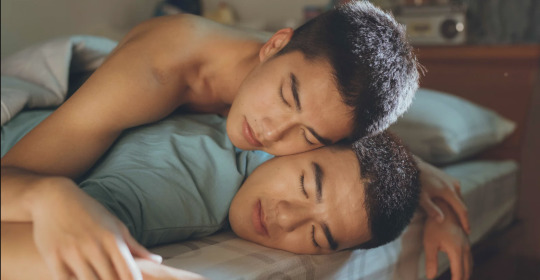
(4) In your opinion, are there any deserving BL series or actors that have been overlooked or underrepresented in past award functions? Who would you like to see recognized in future ceremonies?
Taiwan in general. Politically this can't be done as any awards event where China is participating cannot recognize Taiwan. (Your Name Engraved Herein notwithstanding.)
I'd like to see KBL's start to get some in country recognition, for filming style if nothing else (I'm thinking about TMS 2, 8th Sense, and Semantic Error). But among other things it has its Japanese roots working against it as well as a shorter format and, of course, the gay.
I'd like to see Asian BL's in general get recognition outside of Asia but BL is fighting a loosing battle as romance almost never wins awards let alone non-English language romance, let alone queer romance.
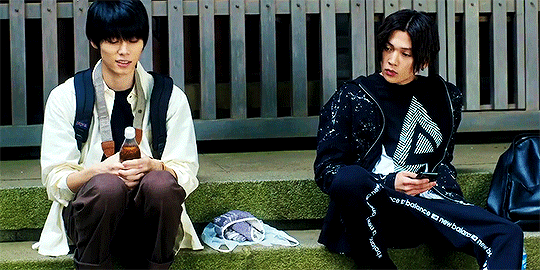
(5) How influential are BL award functions in shaping the industry and driving the production of new BL series? Do you think they have an impact on the types of stories and characters being portrayed in the genre?
I think the biggest influence they have is more direct. For example, My Beautiful Man would not have got a 2nd season if it had not won awards (I don't think). And Old Fashion Cupcake probably would have had a season 2 if it had won something significant (which it should). (Japan is very awards motivated.)
As to whether it effects story I am not sure. I do think the success of something like TMS2 and even (to a certain extent) ITSAY has encouraged Korea (the most savvy of the BL producing industries) into pushing into darker and grittier stuff. Or at least broadening their scope and their formula. (I think the success of KP is prodding them into both higher heat and better chemistry, whether they like it or not. And they don't really like it.) As a result KBL is getting ever so slightly and consistently more flexible.
But also, as they (and Thailand and Japan) continue to produce more and more BL content this was always bound to happen (award recognition or not) because experimentation is a natural progression of exponential growth.

(6) Should there be separate award categories for different aspects of BL series, such as acting, writing, directing, or should the awards be more general to encompass the overall quality of the series as a whole?
Again I would challenge notions of quality and value, also significance and importance, as being something that can be awarded (or even recognized and judged fairly) given the basics of human nature. What I would award for, and what you would award for are, at base level, completely different.
On a simple scale, language alone makes something like quality of dialogue and script difficult to award. What is a clever and fun script in Thai is completely different in Japanese or Korean.

(7) How have BL award functions changed over time in terms of categories, nominees, and winners, and what do these changes reflect about the genre's growth and evolution?
Again I don't know this one either as I don't follow.
I mean what I have noticed that has changed is that BLs are being recognized at all, for anything, and that counts in my book. (Maybe i have too low a bar?)
But I am old enough to remember a time when we didn't have queer rep AT ALL that wasn't death or punching down, so this whole damn bubble of BL joy is a win for me.
That's why I do this blog.
And hand out my own awards...
#asked and answered#bl awards#awards show#bl recognition#what mades for a good piece of content#you decide
32 notes
·
View notes
Text

Barbie Movie Thoughts and Feelings✨🎀:
I’ve seen a lot of takes talking about the Barbie movie in relation to performative/white feminism - that while the message would’ve been revolutionary once, maybe in the 60s, today it’s nothing special and ignores any form of intersectionality within women’s experiences and the feminist movement. I’ve seen a lot of other takes saying that this is irrelevant and a two hour film can’t possibly cover these topics. Both of these comments, in my opinion ignore the nuance of feminist discussions in film and pop culture here’s why:
First of all, bear in mind i myself am a white woman and am more than happy to hear other opinions on the topic, especially from women of colour. Intersectionality is, of course, vital to the feminist movement and I think the makers of the Barbie movie definitely missed something by not acknowledging the differing experiences between groups of women. Personally, i think America Fererra’s speech would’ve been the ideal place to include this message, especially as it was given by a woman of colour and revolved around the double standards imposed on women as a whole. This would’ve been a small way to include such an important (and often ignored) message which could’ve set the film apart from the standard without any deviation from the existant plot. Then again, i truly think the Barbie movie thought they included an intersectional message - this just didn’t come across properly. In my opinion the character of weird barbie was supposed to be an allegory for the different experiences of women, specifically queer (and perhaps less intentionally neurodivergent) women. Her inclusion in mainstream barbie land society at the end of the film may be a metaphor for the society Gerwig wants to see - equality between not only men and women but the eradication of hierarchy between women themselves.
I feel that it was not what the Barbie move didn’t include that was it’s issue, but what it did. These are just my initial thoughts after only watching the film once but what I noticed is that the message got a little muddled towards the end. I left the cinema a little unsure how to feel; the themes of motherhood, equality and inclusion, identity, and humanity overlapped and conflicted, making the overall message confusing, something that wasn’t helped by all of them coming to a conclusion at almost the same point making them feel a little rushed. I understand the desire to include every message you want to spread through your work, I’ve definitely been there, but personally I think that with the plot line of the film as it is the core feminist message of equality should’ve been the focus throughout and conclusion to the film.
None of this is to say I didn’t enjoy the film - I absolutely did, if only for the gorgeous, immersive set design, and I wouldn’t discourage anyone from seeing it. These are, however, a few of my thoughts and feelings regarding the portrayal of feminism within it and my little contribution to the wider discussion :)
I’m more than happy to expand on any points if someone would like to hear more, I’m always up for discussion!!

#barbie#barbie movie#barbie movie 2023#feminist#feminism#intersectional feminism#film#text post#mini rant#margot robbie#margot barbie#margot robbie barbie#greta gerwig#greta gerwing barbie#ryan gosling#ryan gosling barbie#america ferrera
9 notes
·
View notes
Text
Pride and Prejudice: 2005 Movie Adaptation Review
A Review Article By Francis and Nad ( February 2024)
Background, Features and Details
When people think of the phrase “Pride and Prejudice��, most would think of one of two things: the 1813 Jane Austen novel or the 2005 film. The popularity of the novel marked itself as a staple in classic literature that everyone should read. Despite that, some people’s gateway into the story was the film made in the early 2000s.
The two-hour film adaptation of the book was directed by Joe Wright in his feature directorial debut, with Kiera Knightly and Matthew Macfayden playing the main protagonists of the movie. The film places itself around Elizabeth Bennett and her family after receiving the news that a wealthy young gentleman has rented a manor. The Bennet Family, consisting of five sisters and their parents, attends a ball where said gentleman and his companion, Charles Bingley and Mr. Darcy, are present. The story progresses from there; we see how Elizabeth and Darcy’s relationship unfolds, and how their families play into the story. We also see a subplot with her older sister, Jane, and Mr. Bingley.

The Assessment
The 2005 Pride and Prejudice Movie is one of the greatest examples of a book-to-movie adaptation. It was successful in adapting the classical book while also incorporating some modern elements to it. It captured the “comedic” side of the book with its witty lines and great delivery of the actors and actresses that were cast. The acting was also on-point, especially for the characters that played Elizabeth, Darcy and the Bennet Family, since they have brought these fictional people into life.
The film also has excellent cinematography with movie shots that truly capture what the book describes and “feels” while also making them as historically accurate as possible. Original themes of the book like social class, reputation and of course, like what the title states, were also not forgotten in the movie adaption, hence it can be seen throughout the whole production. In addition, the soundtrack of the movie contributed to the commendable storytelling because each scene has a specific musical theme that matches the emotions and feelings of the characters they are focusing on.
What the movie lacked was the creativity with the costumes, specifically the women’s hair, make-up and dresses, but overall almost all of the elements of the film are praiseworthy. There were no dull moments considering that each scene had an entertaining moment in it. This makes it not boring to watch as most period movies are hard to finish. Hence, making it an iconic movie that both period drama enjoyers and romance book enthusiasts undeniably love.

A Movie for Artists, Readers and Fashion Lovers
The movie adaptation is filled with beautiful shots and sceneries that art students can benefit from. It can inspire them to create works based on the movie. Illustrators can get references from the fields of the Bennets to Bingley’s Mansion, to Darcy’s display room. Film majors can also study the movie and learn about its framing, color grading and composition which they can apply to their projects.
Fictional and romance book fanatics can also benefit from the film since its adaptation is accurate to the book. As a result, they can visualize the story more clearly while also enjoying some extra elements such as music, props and some funny ad-libs. Fashion enthusiasts can also take inspiration from how the characters style themselves and incorporate them with modern clothing and looks.
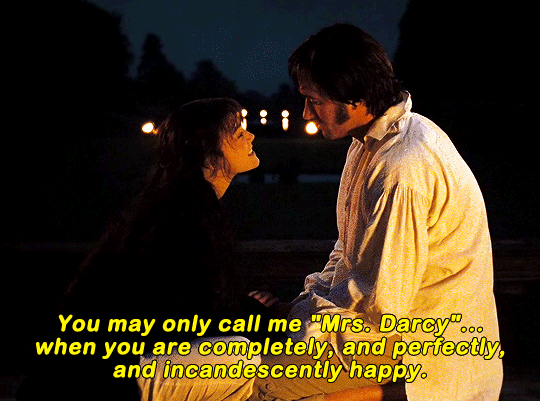
#pride and prejudice#pride and predjudice 2005#joe wright#movie adaptation#movie review#movie recommendation#cinematography#film review#film stills#keira knightley#mathew mcconaughey#romance literature#romance#classic literature
4 notes
·
View notes
Text
the barbie movie's "feminist moments" were generally vapid, it's vague criticism of mattel's history of marginalizing women + consumerism and capitalism and the barbie doll's contributions were so half-baked it was truly insulting (the movie made it clear it was shitting on people who do take issue with that. which like. ok.), and i was literally fuming when a few people clapped after the big ~being a woman is so hard in this world~ speech because it's EMBARRASING that ANYONE would think that was revolutionary instead of incredibly self-pitying. also the stupid scene with hari nef and the glasses did nothing but highlight how there were zero barbies that wore glasses. there was a shocking lack of diversity overall, and there were glaring tokenization issues throughout the film. ALSO THERE'S LITERALLY A SMALLPOX BLANKETS JOKE? WHAT THE FUCK WAS THAT ABOUT? the film's big theme was that the only way women can derive power is by ~showing men who's boss!!!~ and absolutely none of it is inherent to their existence and depends entirely on being oppressed, which is a good thing. i guess. oh and also it's either barbies ruling completely and totally or it's rampant crazy misogynistic kens ruling completely and totally. at no point does a single character glance in the direction of egalitarianism, but rather the whole film reaffirms that there Should be a gender binary and one of those two groups Should be entirely oppressed by the other. because this is the natural order of things. the gender essentialist ideologies it posited were absolute dogshit, through and through. the final line of the movie is literally a joke about how barbie's Big Moment of being A Real Woman is... visiting. the gynecologist.
the worst part is that it was literally laugh out loud funny the whole time. i was pissing myself. when it was funny it was so fucking funny, and thats what SUCKS. if it had just been that, without all that unnecessary stupid shit, it would've been a homerun!!! but no!!! i'm so goddamn mad about it. i want to erase this thing from existence it's truly such an embarrassment.
11 notes
·
View notes
Text
What I watched this week (3/6-3/12 '23)
Perfect Blue (1997, dir. Satoshi Kon)

I'm not saying anything new when I say I loved what a mindfuck this movie is. Truly a masterpiece in keeping you glued to the narrative and second guessing your own interpretation of the film.
It's really hard to talk about this movie without getting into really big spoiler territory but I'll do my best to describe why this film is such a masterpiece. Beyond the striking visuals and the intense score, Perfect Blue tackles the psyche of fame in a way I've never seen done before. It gets it so perfect, from the jealousy, the self loathing, to the wide variety of opinions of the public it paints a compelling picture of how fame literally, and figuratively traps one in it's web. Much like Mima, I constantly found myself backtracking and second guessing the films narrative, and ultimately the payoff left me with just the right amount of unanswered questions. I can't wait to re-watch and pick up on anything I may have missed.
5/5
Fallen Angels (1995, dir. Wong Kar-wai)
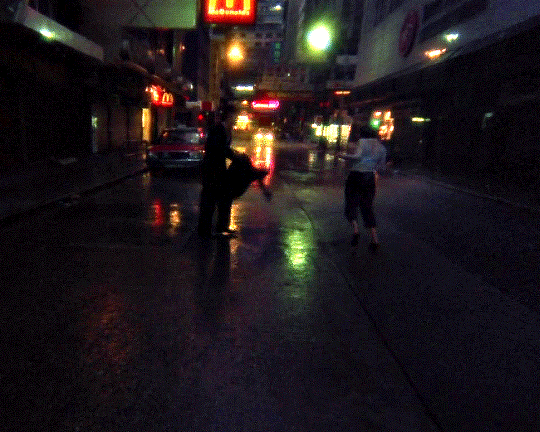
This!!! movie!!! is!!! so!!! sweet!!!! It's a movie about weirdos falling in love made for weirdos. The plot is just a loose thread that holds this bundle of joy and light against the grimey city underbelly together in the bestest of ways. This movie is ultimately about its characters, and for having so many different arcs going on all it once, it manages to give each one the right ammount of time to shine and grab onto my mind enough to leave a mark.
The theme of love and lonlieness permeates and saturates this film through the dark, intimate aesthetics and the bloody over the top gunfights and it makes it something special - and one of my favroites.
5/5
Escape From New York (1981, dir. John Carpenter)
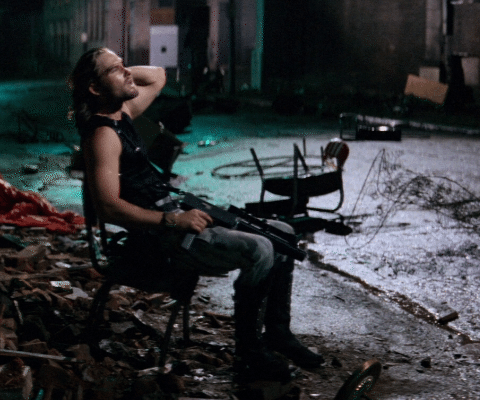
Watching this movie as a metal gear solid fan is a trip, and probably contributed to 90% of my enjoyment of it. I know I know everyone has said it, "Snake plisken! snake plisken!" but there's more to it than that. The pacing, the plot structure, the elements of sci-fi all of it was used as a base in MGS and it's so cool to see it in it's original form!
Metal Gear references aside, Escape from New York is a solid sci fi action flick with good (albeit silly) worldbuilding and a solid, likeable cast of characters. I thought the movie lagged a little bit, but it made up for it in every other aspect - especially in it's action scenes.
4/5
Scream 3 + 4 (2000, 2011, dir. Wes Craven)
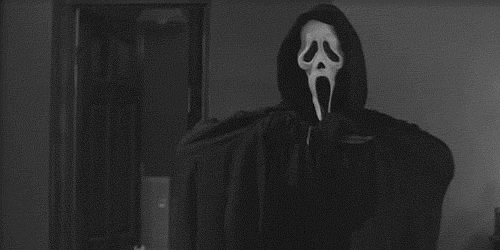
Oh scream, why does everyone love you? Honestly, am I just missing something with these movies? Is there some secret piece of knwoeldge I've glossed over? Or are people just stupid. I don't know. These movies are painfully boring and uninteresting people! The twists aren't fun, the gore is boring, the satire is blunt, and oh my god are the characters ever awful!
Look, I understand that looking for good characters in a Slasher is like trying to find a needle in a haystack, I understand that! But I'd forgive this movie if it didn't spend so much fucking time on them! I do not care about Sidney prescott. I do not care about Gale Weathers. I do not care about Dewey Riley. They are all fine as plot devices to keep the kills coming, but as these movies go on and on they become more and more about these people who I simply do not care about.
Scream 3: 1.5/5
Scream 4: 2/5
Scream + Scream 6 (2022, 20223 dir. Matt Bettinelli-Olpin and Tyler Gillett)
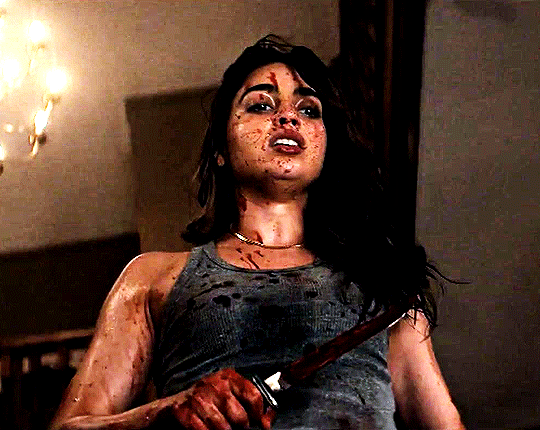
Sadly, new directors couldn't fix this movie. They continue to perpetuate every flaw of the Craven films, and somehow manage to make them worse. The characters are just as flat, the movie is still way to long, and despite all the talk of "requels" , "elevated horror" and "reboots'' the satire continues to feel dated and overall blunt. I'm sorry, Scream franchise but saying something is a trope then doing it is neither funny or good satire.
I also personally find these two insulting as they try to knock sigh "whiney snowflake nerds with letterboxed" accounts down a peg for not enjoying.... shallow cashgrab franchise shlock? very strange angle for a satire to take but alright I guess. Also this film trys to tackle social media and. Just fails so horribly on it. At least 6 finally had some good kills.
Scream (2022): 0.5/5
Scream 6: 2/5
Better Call Saul S6 (2022, shrn. Vince Gilligan and Peter Gould.)
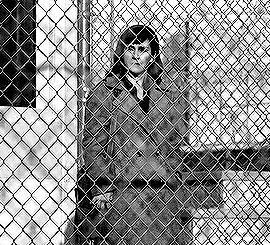
AAAAAAAAAAAAAAAAAAAAAAAAAAAAAAAAAAAAAAAAAAAAAAAAAAAAAAAAAAAAAAAAAAAAAAAAAAAAAAAAAAAAAAAAAA. That is my emotions on the end of this show. OH MY GOD what a ride this series has been, did you know I actually started it to get some inspiration for a long abandonded fanfiction? because I did. And GOD am I ever glad I did because the payoff, the journey was incredible. I haven't been this nethralled by a TV show in perhaps ever. I was on the edge of my seat for the entirtiy of season 6, just waiting to see how it would all come crashing down and MY GOD did it ever.
It is so hard for me to be and speak normally about this show, in fact I don't think I could even if I tried so I'm just going to leave it at that. Until next week folks!
#Js film diary#cineblr#film#movies#movie review#horror movies#anime#forgein film#Fallen Angels#Scream#Ghostface#Perfect Blue#Better Call Saul#Breaking Bad#escape from new york
14 notes
·
View notes
Text

SOLO DEBUT MISSION 002
SCHEDULE TYPE: TRIMESTER ( PART 1 OUT OF 1 )
SCHEDULE RESTRICTIONS: only for LEE JIHO.
a few days after the filming of FUTURE DREAMS: ALUMNI ( JANUARY 13 ), JIHO meets up with his new and temporary manager for his solo work, HWANG SEUNGJO.
“i know we’ve gotten to know each other a bit during your time filming for FUTURE DREAMS: ALUMNI, but i will be your manager in the meantime.” SEUNGJO smiles at the idol before beginning to explain all of the preparations that JIHO will have to do in the next few weeks. “it’s going to be a bit hectic for you since you will be preparing your solo debut along with agito’s comeback, but this is why the general public will not know about the results until FEBRUARY 15.”
JIHO will be making his solo debut the day after the airing of the finale, FEBRUARY 16. since the preparation time is limited, he will only be having two songs in his debut; CHASER, which was performed in FUTURE DREAMS: ALUMNI, and POSE, which will be his title track. lyrics distributions for this can be found over HERE.
from the day of the meeting until his debut, JIHO will be spending the majority of his time preparing for the debut so this will include the behind the scenes aspects of it ( eg. lyrics writing, composition, arrangement, styling, choreography, etc. )
NOTE ABOUT FUTURE RELEASES
depending on circumstances and schedules, there is a possibility that from here and onwards JIHO may have solo comebacks and has a chance to send in songs that can be used for those comebacks.
ARTISTIC CONTRIBUTION
similar to the second round of FUTURE DREAMS: ALUMNI, you will be asked to decide how many points have been contributed to each of the stages. the stages are as follows:
SONG CONCEPT ( MAX VALUE: 429 ): this is the general concept of the song, not only the audio aspect (genre, theme) but also the visual aspect of it (type of choreography, type of styling, type of performance). it’s a bit of a summary of everything related to the song
COMPOSITION ( CURRENTLY HAS: 212; MAX VALUE: 250 ): song composition (related to MUSIC COMPOSITION + INSTRUMENTS skills)
LYRICS WRITING ( CURRENTLY HAS: 213; MAX VALUE: 250 ): lyrics of the song (related to LYRICS COMPOSITION skill)
ARRANGEMENT ( CURRENTLY HAS: 212; MAX VALUE: 250 ): song arrangement (related to MUSIC COMPOSITION + INSTRUMENTS skills)
CHOREOGRAPHY ( CURRENTLY HAS: 65 [ CLASSICAL ]; MAX VALUE: 250 ): choreography of the song. please note that even if some slower songs have no proper dance steps, most of the performance are still choreographed for the lightning and cameras to follow at the right moment during performances
STYLING ( MAX VALUE: 429 ): encompass hair, make-up and outfits
STAGE PRODUCTION ( MAX VALUE: 429 ): the props, effects and lights used
for JIHO, he is given 1390 points as the max contribution value across all of the stages. listed in parenthesis for each skill is the maximum value of points that can be distributed to that specific stage and the current points he has for the skills mentioned based on our database.
to help us get a better understanding of which areas JIHO focused on for the debut, please fill out the form below and send it to the lgcmanager blog before FEBRUARY 3, 2024 11:59PM EST:
MUSE NAME ∙ ARTIST CONTRIBUTION
- SONG CONCEPT: [ insert number of points used ]
- COMPOSITION: [ insert number of points used ]
- LYRICS WRITING: [ insert number of points used ]
- ARRANGEMENT: [ insert number of points used ]
- CHOREOGRAPHY: [ insert number of points used ]
- STYLING: [ insert number of points used ]
- STAGE PRODUCTION: [ insert number of points used ]
- TOTAL POINTS: [ add up all of the points used from all of the stages, maximum overall points should be 1390 ]
STAGE NAMES
as a reward for joining the soloist roster, JIHO is given a chance to pitch in a stage name solely for his solo work. all of the information for that can be found in the STAGE NAMES post!
‘JIHO’S GOING SOLO’ VLOGS
SEUNGJO explains, “since this time is a very special one for you, LEGACY suggested that you will be vlogging the whole experience for the fans to see. unlike the vlogs you’ve probably done with V&A, you’re given a bit of leeway with the content of these vlog episodes.”
JIHO will be vlogging his whole solo debut experience from the preparations to the promotions. for the first two episodes of this series, it will focus on the BEHIND THE SCENES aspect. one episode will be about song preparation in his studio ( with his creative team ) and another episode will be about the visual preparation ( eg. learning/giving ideas for the choreography, suggesting outfit ideas and stage production, etc ).
for this part, it’s best to focus on filling out the form above ( ARTIST CONTRIBUTION ) before deciding the content behind the two episodes.
the remaining episodes in the series will be related to JIHO’s promotions!
SOLO PROMOTIONS
on FEBRUARY 16, JIHO will have a debut showcase for the press as he answers the interview questions and performs both of his songs to the public for the first time. later on that day he will start off his music promotions as he will attend all of the music shows until MARCH 3. during that time he will be attending fansigns and meeting up with his fans.
JIHO’s title track will be ranked 3rd and 4th in the music charts and will slowly go down by the time HARU makes their comeback with “WIND AND WISH”.
in terms of gigs, JIHO will be filming an episode of “THE SEASONS: RED CARPET WITH LEE HYORI” and it will be aired on FEBRUARY 23. in the episode, he will be performing both of the songs and be interviewed by LEE HYORI afterwards. in addition to that, JIHO will be participating in two buzzfeed videos; “THE PUPPY INTERVIEW” and “CELEBRITY READS THIRST TWEETS”.
the PUPPY INTERVIEW will be vaguely similar to this video where JIHO will be answering some of the fans questions while taking care of and playing with five puppies ( it’s up to you to decide which breeds they are )! and then for the CELEBRITY READS THIRST TWEETS, it will be similar to this video where JIHO will be asked to react to tweets sent by his fans about him.
CELEBRITY READS THIRST TWEETS INFO
for this particular show, we’re giving some people in the lgc community to help pitch in and create thirst tweets for the idol! for this, since there will be a solo component related to the filming of this episode, JIHO’s mun can ask people who has not interacted with the mun ( as in on any of the mun’s muses ) to send in the “thirst tweets” ( you can check the video above to get a general idea, but make sure that the tweets are tame! )
for the tweets, there is a minimum of 7 tweets ( each from different muns ) and a maximum of 20 tweets ( each from different muns ). it’s up to JIHO’s mun to decide how many and which one of the tweets to use for the solo ( but the solo post must include which mun/muse suggested/wrote the tweet so we can make a list of it on our end ).
REQUIREMENTS
PREPARATION EPISODES: write a 300+ word solo about JIHO preparing for his solo debut ( as mentioned above, ic wise one episode will be about him working on and recording the songs in his studio and another episode will be about working on other aspects for his debut ). this task can be done up to two times, but each solo must be about one of the episodes ( so one about the studio and then one about the visual preparation ). completing this will reward you with +10 POINTS TO MUSIC COMPOSITION, LYRIC COMPOSITION, INSTRUMENT ( SPECIFY ), CHOREOGRAPHY ( SPECIFY ), and +8 NOTORIETY !
PROMOTIONS EPISODE: write a 300+ word solo about JIHO during the promotion period ( eg. behind the scenes with the music shows, attending fansigns, filming for the seasons or the puppy interview ) for +9 SKILL POINTS TO DISTRIBUTE ANYWHERE and +13 NOTORIETY !
CELEB READING THIRST TWEETS: write a 300+ word solo about JIHO reading the fan tweets. the solo MUST include at least 7 tweets suggested by the lgc muns ( who you have not interacted with on any of your muses ) and a maximum of 20 tweets along with who had written what tweet. completing this will earn you +7 VARIETY and +7 NOTORIETY !
make sure to use the hashtag lgc:sdmission002 for anything related to the event. you have until APRIL 27, 2024 at 11:59PM EDT to complete the requirements and validate your points. please submit the following form ONCE on the points blog.
MUSE NAME ∙ SOLO DEBUT MISSION 002
- PREPARATION EPISODES: +10 ( music composition, lyric composition, instrument [ specify], choreography [specify] ), +8 notoriety [ LINK ] ** can be done twice **
- PROMOTIONS EPISODE: +9 ( skill points distribution ), +13 notoriety [ LINK ]
- CRTT: +7 variety, +7 notoriety [ LINK ]
4 notes
·
View notes
Text
Ozu's Tokyo Story Blog Post Discussion
During my watch of Ozu’s Tokyo Story, I found myself comparing the style of directing he took with I Was Born, But…. Both were a slow burn, but I learned to appreciate it as I believe it added to the realistic pacing of ordinary life. However, I believe this film’s plot picked up quicker than I Was Born, But…. Tokyo Story was quite a depressing watch, with the only release of sweetness being the ones that Noriko, the widow of Shoji, shared with Tomi and Shukichi, the parents. I originally had high hopes for the movie to be a heartwarming family film while watching how sweetly Kyoko interacted with the parents. However, once the parents reached Tokyo to visit their other children, I was disheartened to see how disconnected the kids were from them.
Small things within the dialogue showed this disconnect. The first thing I noticed was when one of the grandchildren showed anger and frustration over his desk being moved in order to accommodate the visiting arrangements for his grandparents. This might be an over-analyzation, but I thought it showed that he is quite distant from his grandparents. It was noted that he did not study all that often and hardly used the desk, however, it seemed like it was more of an invasion of space by people he is not all that connected to. Larger examples included the children not really caring to create space in their lives to entertain their parents and being more concerned about their jobs and free time. They even sent them to the hot springs just to keep them away and entertained without doing the work to do it themselves, claiming they’re too busy. It almost seemed like they were annoyed by their presence. It seems like the theme of slowly pulling away from parents as you age was the point Ozu was trying to get across with this film, as depressing as that is. Other than showing a faithful and devoted daughter-in-law despite the death of her husband, I believe Ozu used Noriko to compare to the actions of their children. Noriko was the main source of entertainment and tenderness in the film, representing a better parent-child relationship than their own blood-related children could offer.
Not sure if this is a stretch, but I believe Ozu was trying to put forth the vision of how capitalization and Westernization have changed society in Tokyo, and how it affects family relationships. We see it in the clothes, the look and industrialization of Tokyo, and how the children prioritize their work rather than spending it with their parents. They emphasize the distance of where the parents live from the city, so this can also contribute to the physical distance between the parents and children as well as the emotional distance.
Overall, I enjoyed the movie as it seemed like a relatable tale for a wide range of viewers including myself. As I grow older, I find myself creating distance from my parents. I am not educated on the topic and understanding of traditional and modern parent-child relationships within Japan. However, being Filipino-American, I struggle with the Filipino standard of parent-child relationships being very significant and stressed while American family relationships tend to show this pull-away from parents as we age. I’m not sure if this is exactly what Ozu was trying to depict in this film, but this struck a chord for me.
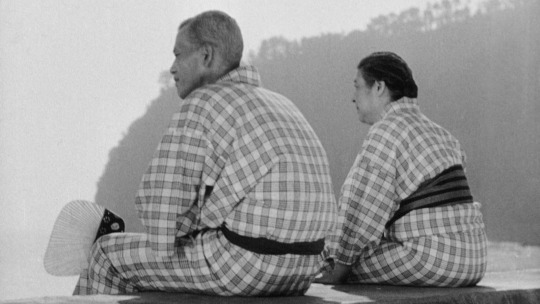
2 notes
·
View notes
Text
The Main Pitch
The final pitch I think went very well, we went into a lot more detail which created a good understanding of the story to most.
I definitely talked a lot which was pretty hard, I was having quite a bit of anxiety over it the night before as I didn't want to get confused since the treatment is quite complicated but it needed to be well presented in order to give an accurate depiction of the idea. Once I started talking then I got into the flow of it.
I went into the full plan/treatment of the film and this was honestly pretty hard to think of as we don't actually know what the film is going to turn out like. So there are no guarantees that the final result will be anything comparable to what I discussed.
I think that my team did a great job as well and our overall presentation was very cohesive. It was honestly very inspiring to hear all of us talk about what we want to contribute in order to make this project as good as it can be. We all seem to have the same goals/ambitions so I really do trust everyone in my group which I think will be necessary for creating this documentary. We have a limited amount of time in Poland and so I need everyone to be functioning as a single organism.
The questions from the lecturers seemed to be mostly surrounding our workflow and how we are planning on editing and capturing the footage which I understand can be a challenge because the shooting location is within another country and so we have to be organised.
Apart from that, the main part of feedback I disagreed with is the idea that we should stay within the house only. This is because I mentioned that one of our other main shooting locations will be the graveyard, as I find this to be our second home. When I mentioned that the graveyard is an extension of our home one of the lecturers called the comparison to be "morbid". I think this comes from not really understanding Polish/slavic culture in general. Visiting graveyards and decorating graveyards is a massive deal in Polish culture. Most people visit their family graves a few times a year but with my family we visit weekly/monthly. I think it's just a different perspective on those kinds of things. And the themes of this documentary will be unfortunately "morbid" to some spectators as my father is in fact dead.
The documentary that I have planned so far will be taking on a quite normal narrative journey from the feeling of loss/grief and frustration to an acceptance and an appreciation of what we've had and what I continue to have. Accepting the new kind of relationship I will have with my father that is separated through time. I think that the relationships that we have with our loved ones does not end once they have passed. The relationship at times gets closer, the amount of energy and thought I have put in to repair my perspective of my father still feels like I am actually mending my relationship with him. Having healthier and more positive outlooks on the times that we've had with eachother as I have grown and matured more. So I am making this from my present perspective of my father, as since his death my outlook on him has changed, our relationship has evolved and I will now be creating a film that explores this phase of my journey with grief.
4 notes
·
View notes
Text
Gender, Genre, and Excess: 'Don't Worry Darling'
youtube
Plot:
Alice and Jack Chambers, a married couple, live in the 1950s-era town of Victory. Alice begins to uncover unsettling secrets about their seemingly perfect world. She learns that Victory is a simulated reality created by Frank, where the men lead ideal lives while the women are trapped in a 1950s simulation.
youtube
In Olivia Wilde's "Don't Worry Darling," excess serves as a central narrative tool, creating a film that is both suspenseful and emotionally charged. At the heart of this lies the character of Alice (Florence Pugh), whose journey from a seemingly content housewife to a woman plagued by paranoia and fear is marked by intense emotional turmoil.
The film employs an excess of emotional distress to craft an atmosphere of psychological unease. Alice's life takes a dark and unsettling turn as she witnesses Margaret's (KiKi Layne) tragic death, experiences surreal visions, and becomes increasingly paranoid about the secrets of Victory (a 1950s Californian utopia). This emotional intensity heightens tension and sets the stage for a narrative that thrives on psychological horror.
Within the film, we can find an excess of sex (highlighting female pleasure), but those encounters become a diversionary tactic. Passionate, (arguably unnecessarily explicit), and seemingly consensual sexual moments between Alice and her husband, Jack (Harry Styles), serve as a smokescreen, deflecting Alice's attention from what's actually going on. The excessive focus on sexual distractions becomes a manipulative tool to control her perception of the world she's living in.
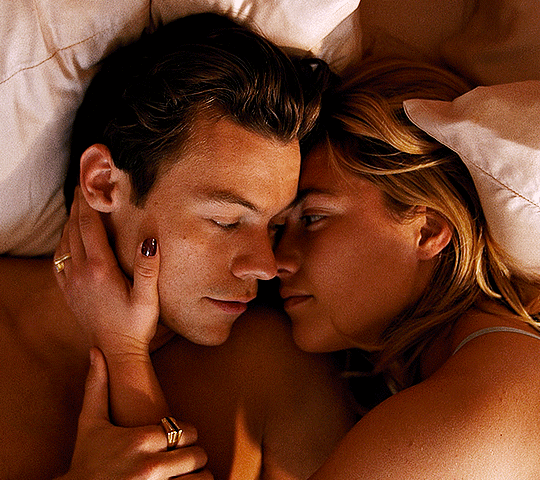
But, beneath the surface of these sexual distractions lies an excess of psychological violence. Alice is systematically gaslit and made to believe she is descending into madness. The film portrays an excess of psychological manipulation, gaslighting, and isolation tactics employed by characters like Jack and Frank (Chris Pine). This excessive portrayal of psychological violence contributes significantly to the film's overall atmosphere of psychological horror. Alice's experience of being questioned, isolated, and subjected to electroshock therapy underscores the extent of the psychological violence she endures.
In the context of gender roles, the film presents an excess of traditional expectations placed on women. Women in Victory are forces to serve men, and this theme is highlighted throughout the narrative. Their primary role, it seems, is to cater to the needs and desires of the men, often at the expense of their own autonomy. The excess of gender roles dictates that women are expected to serve men, regardless of the circumstances.

When examining the film's racial dynamics, you notice a lot of double standards. "Don't Worry Darling" features a predominantly white cast, and one main black character, Margaret. Margaret's character is marginalized within the narrative, ostracized by her community, and ultimately meets a tragic end. Her voice is largely dismissed, and she is perceived as unreliable. This treatment of Margaret highlights the racial imbalance in the film, where her concerns and experiences are not given the same weight as those of the white characters.
The racial disparity becomes even more pronounced when Alice, a white woman, starts raising similar concerns. Suddenly, her claims are taken more seriously, and the excess of disbelief directed at Margaret is replaced with an excess of attention and concern. This disparity in how the characters are treated underscores the film's racial imbalance, where the voices and experiences of black characters are marginalized and overshadowed.
In "Don't Worry Darling," excess is not confined to individual elements but is interwoven into the narrative, creating a gripping and suspenseful storyline. Alice's transformative journey, marked by emotional distress, sexual encounters, psychological violence, and racial dynamics, serves as a compelling exploration of the effects of these excesses.
Questions:
Would you say this film is feminist?
According to Wilde, she intended for the audience to “realize how rarely they see female hunger, and specifically this type of female pleasure.” do you think the reveal changes that statement?
How does the movie 'Don't Worry Darling' explore the dynamics of power, race, and desire within its seemingly perfect society?"
@theuncannyprofessoro
13 notes
·
View notes